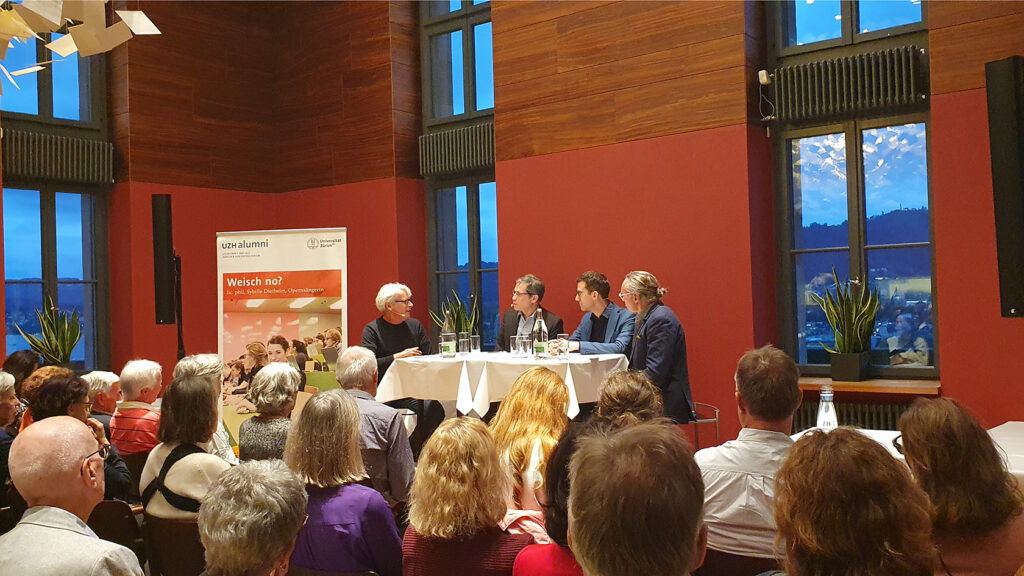Applications of artificial intelligence are everywhere. In the UZH ‘Talk im Turm’, Prof. Abraham Bernstein and UBS Foundation Professor David Dorn discussed how they could change the world of work.
This article by Stefan Stöcklin was originally published in ‘UZH News’ on 4 November 2024 in German. Translated by the UBS Center.

Since the company OpenAI released the language robot ChatGPT two years ago, new applications that influence our daily lives and the world of work are emerging almost daily. The question arises: Are we on the verge of a revolution in the world of work because of artificial intelligence (AI)? The two guests in the “Talk im Turm” on the topic “With brains and AI, how we will work in the future” had differing views on the theme. Computer science professor Abraham Bernstein said, “I think so. We are experiencing a breakthrough that has catapulted AI into the consciousness of the general population.” . David Dorn, professor of globalization and labor markets, sees the development somewhat less drastically. “AI is not turning the world upside down, I don’t see a revolution,” said the economist. Although people are aware of AI, there is no sign that jobs are being lost on a large scale as a result.
AI increases efficiency
The discussion, moderated by UZH Magazine editors Thomas Gull and Roger Nickl, provided interesting insights into the highly topical issue of artificial intelligence. On the subject of the future of work, both experts agreed that there is no prospect of artificial intelligence replacing entire occupations or professional fields. The technology is not yet advanced enough to take over entire activities, said Bernstein. Instead, AI will increasingly support us in individual tasks, said Dorn. Typical examples are the creation of texts and illustrations or support with programming.
Amid the hype surrounding artificial intelligence, the question of the extent to which it endangers the jobs of highly qualified workers has been discussed repeatedly. Since the computerization of the working world in recent decades has largely eliminated manual jobs in industry – keyword automotive engineering – AI could also endanger the well-trained specialists and experts in the future. Where this development will lead is unclear due to a lack of data from labor markets, according to Dorn. On the other hand, it has been shown that AI can also help well-qualified professionals develop expertise at an unprecedented rate. “Inexperienced workers become more experienced more quickly thanks to training by AI,” said David Dorn.
Abraham Bernstein mentioned the examples of advertising professionals who, thanks to AI, could more quickly run through possible slogans for a campaign. Or computer scientists who could program faster thanks to AI. In both cases, the new tools made good specialists more efficient, but not replaceable. Bernstein emphasized that human expertise is still needed for quality assurance at the end of the process due to the technology’s susceptibility to error. On the other hand, economist Dorn claims that the increase in efficiency could lead to higher productivity. Whether or not this increase in productivity would lead to job cuts in the long term and thus also threaten the jobs of highly qualified specialists is an open question that depends on the field of work.
An opposite effect might also be possible: David Dorn gave an interesting example from pharmaceutical research: if AI increases the output of interesting active ingredients, this could also lead to an expansion of this field of research and activity. After all, there are enough diseases for which new active ingredients are being sought. In such a case, artificial intelligence would not lead to job losses but to an expansion of jobs.
Teamwork required
The discussion group came to the conciliatory conclusion that, despite the boom in digital helpers, we will continue to work with people and not just with artificial avatars in the future. We are social beings; we need to exchange ideas and we will not become redundant. What is needed most in the future as a worker is the ability to work in a team with both machines and people.